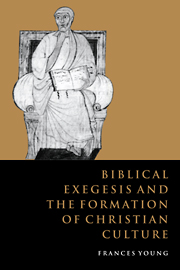Book contents
- Frontmatter
- Contents
- Preface
- List of abbreviations
- Introduction
- PART I EXEGESIS AND THE UNITY OF THE SCRIPTURES
- PART II THE BIBLE AS CLASSIC
- PART III LANGUAGE AND REFERENCE
- 6 Reference and cross-reference
- 7 The sacrament of language
- 8 Allēgoria and theōria
- 9 The question of method
- PART IV THE BIBLE AND THE LIFE OF FAITH
- Conclusion and retrospect: towards an outline historical account
- Bibliography
- 1 Index ofbiblicaI references
- 2 Index of modern scholars
- 3 Index of subjects
7 - The sacrament of language
Published online by Cambridge University Press: 02 December 2009
- Frontmatter
- Contents
- Preface
- List of abbreviations
- Introduction
- PART I EXEGESIS AND THE UNITY OF THE SCRIPTURES
- PART II THE BIBLE AS CLASSIC
- PART III LANGUAGE AND REFERENCE
- 6 Reference and cross-reference
- 7 The sacrament of language
- 8 Allēgoria and theōria
- 9 The question of method
- PART IV THE BIBLE AND THE LIFE OF FAITH
- Conclusion and retrospect: towards an outline historical account
- Bibliography
- 1 Index ofbiblicaI references
- 2 Index of modern scholars
- 3 Index of subjects
Summary
How can God be expressed in human language? Athanasius, we have already observed, insisted that the Arian interpretation of the language about the Son of God was blasphemous. ‘Son’ was not an improper term, strictly speaking misapplied, nor were ‘Word’ and ‘Wisdom’ mere ‘names’ attributed to a son adopted by grace: their sense had to be understood in a manner appropriate to the divine reality to which they referred. By referring these terms to the one true Son, the ‘earthly’ meaning of the human language that scripture uses could be corrected, modified or, as I suggested, ‘elevated’. This mode of interpretation is not literal, but neither is it allegorical. One of the less widely recognised effects of the Arian controversy was to highlight the problem of defining God. So many think of the process of doctrinal formation as a progressive definition of belief, but the argumentation, particularly with the neo-Arians like Eunomius, gainsays that. Gregory of Nyssa developed Athanasius' treatment of religious language, stressing in what can only be described as his theological spirituality the incomprehensibility of the infinite God: with no ‘boundaries’, external or internal, the divine Being was in principle indefinable and therefore unknowable. The Arian insistence on defining God as agennētos and making deductions from that was invalidated from the start.
- Type
- Chapter
- Information
- Biblical Exegesis and the Formation of Christian Culture , pp. 140 - 160Publisher: Cambridge University PressPrint publication year: 1997



